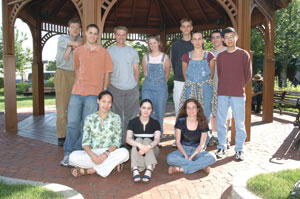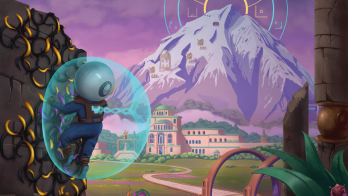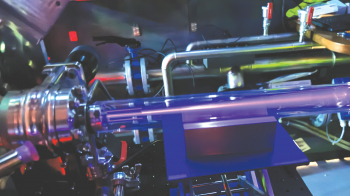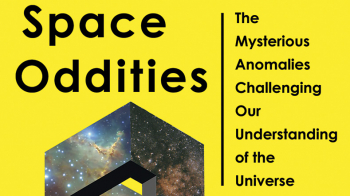Northeastern University’s programme of research experience for US undergraduates at CERN is five years old. Suzanne Harvey takes a look at its impact.
Boston’s Northeastern University launched its Research Experience for Undergraduates (REU) programme at CERN in 1998. Joining summer students from the laboratory’s member states, the participants use their experience to help them to establish what direction their careers will take. Christine Nattrass, a double major in biochemistry and physics at Colorado State University, says that her experience in the programme has influenced her future. “Now I’m more certain I want to study physics rather than biophysics or biochemistry,” she says, “and I think I’d like some kind of particle physics. The research experience confirmed my suspicions that physicists are more fun to work with than biochemists.”

Christine admits, however, that only time will tell just how deeply the whole programme has influenced her. Other students say that the experience at CERN helped determine what course their future studies will take; some have decided that they are more interested in theory than in experiment, while others say that the work they did over the summer has reaffirmed their love of the field.
Assessing the impact
Just as the students have to determine how their experiences in the programme have affected them, so the long-term impact of the programme itself must be assessed. Just how important are educational and research programmes of this sort, and what should their future be? It is often difficult to make these decisions when the programmes are still new, but now that the REU programme has reached maturity, we can begin to get a clearer sense of its value.
CERN has had a summer programme for undergraduate students for more than 40 years, but US students have only been able to participate since the REU programme was formed. Historically, only CERN member states have had the opportunity to send their students to experience what it’s actually like to work in a physics research group at the laboratory. In 1997, however, Stephen Reucroft, an experimental physicist at Northeastern University, sent a proposal to the US National Science Foundation (NSF) for funding to send US students to the summer student programme at CERN. Independently, Homer Neal of the University of Michigan made a similar proposal, and the NSF suggested that the two join forces. The result was the programme that exists today. CERN agreed to take 10 US undergraduates from the REU programme, starting in 1998.
After three years of running a joint programme, Reucroft and Neal split the programme in two and started sending 10 students each. The CERN summer student programme places half, and Northeastern University and the University of Michigan place the remainder. Additional funding has been provided by the Ford Motor Company, which now supports five students.
Participants in the REU programme are chosen from colleges all over the US, from small institutions as well as the larger, better-known universities. A committee of physicists chooses students with a strong academic record, an interest in physics, demonstrable creativity and a desire to take advantage of CERN’s culturally diverse environment. The social and cultural life of the programme is as important as the research and educational elements.
REU organizers brief successful candidates about what they can expect, and encourage them to network before they leave for Switzerland. There is a four-day orientation meeting for students in the US, and a programme administrator accompanies them to CERN and gives them a tour of the laboratory’s facilities. After they have settled in, the REU administration keeps in touch with the students throughout the summer. One of the programme’s coordinators, Artemis Egloff, says: “We try to keep a good balance between helping them and smothering them with too much attention. They like to be independent and we encourage them.”
While at CERN, the US summer students work with an assigned research group, supervised by a physicist who works with them and assigns them various tasks, allowing them to see what work as a particle physicist is like. Students perform research, take measurements, write computer programs, papers and reports, learn to use specialized software, build and test equipment, and inevitably do manual work. In short, they are expected to cover the entire range of activities that makes up experimental particle physics.
Students are expected to learn new skills on the fly – things that they don’t learn in the classroom. Their work is often disorganized and their days frequently unstructured, but as Reucroft points out, this is what research is often like. Students are often surprised at how much mundane manual labour is involved in science, such as connecting cables, and moving and stacking lead bricks.

Although hands-on work forms a large part of the activities at CERN, the students also attend lectures in experimental and theoretical physics, and in accelerator and detector techniques. Andrew Essin, a student at Reed College, Oregon, explains: “There were lectures on experimental high-energy physics, which allowed me to get a view of more than just mathematical formalism and phenomenology, to see the nitty-gritty of creating and detecting particles, accumulating and processing vast quantities of data and all that good stuff that I might miss if I simply concentrated on theoretical studies.” The CERN lectures focus on the detailed techniques of particle physics in both experiment and theory. Since the students are a mixture of potential experimentalists and theorists, the lecture material benefits all of them. In ordinary classroom lectures, most of what is taught about physics is historical information, neatly packaged.
The lectures often cover material that is too new to be taught to US physics undergraduates. As a consequence, some of the students find the lectures difficult. One, however, said that even the material he did not understand will be valuable to him eventually – either he will process it once it has had time to settle, or else the fact that he has already been exposed to it will make him feel more comfortable next time he comes across it.
International culture
The international atmosphere at CERN makes it an ideal place for US students to learn how scientists from different countries bring different approaches to physics. Students and advisors not only work together, but also get to know each other socially. Many returning students have remarked on the spirit of tolerance that reigns in CERN’s multicultural setting, with people choosing to pass over potentially awkward social situations rather than giving them too much weight or taking offence at unintended slights. Inevitably, this attitude is carried over into the work environment. The students learn how people in other countries are educated, and discover the strengths and weaknesses in the US system, as well as in others. It is one of the aims of the REU programme that as the students develop, they will keep in mind what they have learned, and perhaps bring good ideas back to the US system.
The vast majority of undergraduates participating in the REU programme have gone on to pursue PhDs in the sciences, including various aspects of physics, biophysics and aeronautical engineering. One became a Rhodes Scholar, and another went into business, although she changed her mind after a year and went back to physics because her experience at CERN was so good. One spent time developing computer simulations at a financial institution and is pursuing a Masters degree in architecture at MIT. He hopes to enter into a physics PhD programme after he has completed his Masters.
One of the main challenges of the REU programme is placing students with advisors. Even the best-intentioned researchers can find themselves unexpectedly busy by the time the summer arrives, and it is not uncommon for students to find themselves working largely independently. However, Reucroft says that experience has shown that if an advisor can motivate a student and give them a start, they frequently end up working happily and productively on their own.
Like the CERN summer student programme, the REU programme has a great potential impact. It helps students decide whether or not to pursue an advanced degree in physics. By ensuring that they are well informed about the nature of research before they embark on their career, it helps students find out whether experimental or theoretical physics – or even no physics at all – is right for them. It also attracts young people to science, exposing them to the demands and rewards of working at the leading edge of experimental physics, showing them how experiment and theory work together, and how particle physics impacts other branches of science. Perhaps most importantly, students also learn skills that are helpful in whatever career they choose to pursue, such as programming, problem solving and working with people from different backgrounds. All of the students who have participated in this programme say that they would recommend it to their friends. And it is safe to say that the majority will go on to be good ambassadors for science and for international collaboration, wherever their future careers take them.







